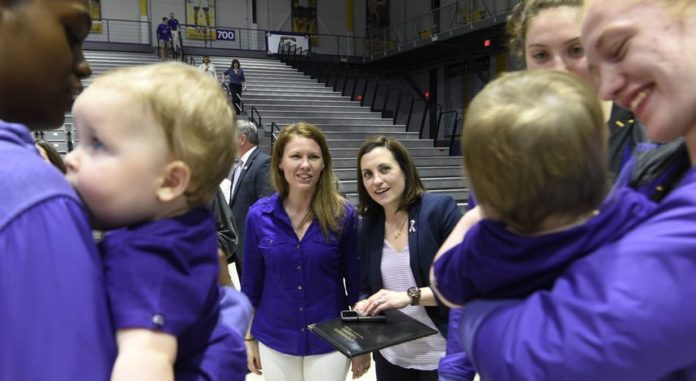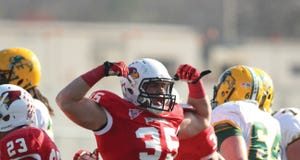
When the phone call begins on Thursday, Colleen Mullen’s kids are splashing around in the swimming pool.
When it ends 25 minutes later, Maggie, 6, and twins Brennan and Callan, who turned 4 last week, were getting after some pizza.
“We’re just such good chefs,” UAlbany’s women’s basketball coach said with a laugh. “We decided to deal with DiGiorno. Natural rising crust, I guess.”
Who knows how many people in this country still believe that this scene of a happy family at home shouldn’t be happening, and would go so far as call it an abomination, for the simple fact that the parents are both women. Colleen and her wife, Lauren, were married in May of 2014 in New York state, just over a year before the U.S. Supreme Court voted 5-4 that the Fourteenth Amendment requires all states to grant same-sex marriages and also recognize same-sex marriages granted in other states.
So … progress, as Pride Month 2021 passes the halfway mark. On Monday, Colleen Mullen will talk about progress that the LGBTQ+ community has made, as a panel member for the 10th episode of the America East Conference’s Spread Respect series of webinars, along with Stony Brook soccer player Ranae Ward and NJIT facilities manager Casey MacDonald, all openly gay people involved in college athletics.
They’ll talk about the challenges, too, because those are ongoing, as the most recent Supreme Court decision — Friday’s Fulton v. City of Philadelphia 9-0 decision — might indicate, depending on to what degree you believe it was a victory for religious freedom and/or a defeat for LGBTQ+ rights that opens a crack in the door to discrimination on how foster children are placed.
Mullen will bring the perspective of a coach to Monday’s discussion, which is open to registration for live viewing by those affiliated with the AE but will be archived on YouTube. Conference commissioner Amy Huchthausen, who is stepping down soon for another job and has been a driving force behind the AE’s wide variety of social justice and activism efforts, will serve as moderator.
Mullen will offer her experiences both as a gay woman in general, but also as a college basketball coach in particular, with the objective being to further a nation-wide conversation aimed at gaining acceptance and inclusion for LGBTQ+ people, a conversation with firm roots but needs constant cultivation for those whom it affects directly.
“There’s no better time than now, with everything going on in terms of social justice and Black Lives Matter, for people to have some more acceptance and less hatred,” Mullen said.
“We’ll talk about certainly some of the successes and the positivities of living your true self and your authentic life, which is so valuable. So I’m excited to tell some of my story and just provide a perspective of how it’s gone for me and be able to thank a lot of people. Being able to be that voice to other people gives them the confidence to really be who they are.”
Part of Mullen’s story is the process of coming out as gay, which occurred for her when she was a student at the University of Rhode Island, then New Hampshire, in the early 2000s, a feisty pass-first point guard who went on to earn her MBA from Southern New Hampshire in 2006.
She grew up in a Catholic family in North Chelmsford, Massachusetts, outside Lowell northwest of Boston near the border with New Hampshire — “a very homogeneous town” — and the two primary elements to this part of her story are the self-realization, and communicating that with her family.
Neither happened quickly, or easily. But they happened.
“When I was around people in college that were different than me, I started to think, ‘Oh, maybe this is really who I am,’” she said. “And I think deep down I always really knew, but I wasn’t sure, because I wasn’t exposed to it. There was nobody I could look up to. There was nobody that made it safe to me.
“It was a struggle a little bit with my family in the beginning, just because it wasn’t socially acceptable. Like, my parents having to explain to other people, ‘Oh, Colleen has a girlfriend.’ I was like, ‘Just tell ’em I’ve got a rich, handsome, tall doctor-slash-lawyer, he has multiple cars. Just go to town, tell them what they want to hear. It doesn’t matter. It’s not your story to tell. All your story is to just do what you’ve done and support me and love me.’
“That was 21 years ago. And now, I’m here, I’m a head women’s basketball coach at the Division I level, and it’s not a big deal. If it’s a big deal to other people, I don’t care. Luckily, that’s my personality. I am who I am, I’m doing the best job that I can, I care about other people, I care about my players, and, to me … what does it matter? If it matters to you, that’s your prerogative, I’m not ignorant to that, but … do your thing, chicken wing.”
Another reality for women in Mullen’s profession is that there is history of straight coaches attempting to weaponize a rival’s homosexuality in the highly competitive recruiting process, using it as a tool to convince prospects — and/or their parents — not to go to another school.
They do this by tapping into moral disapproval, or even characterizing a homosexual coach as somehow a threat to the recruit.
Mullen said she believes this probably still goes on at a minimal level, but is increasingly less effective, primarily because today’s high school players are less inclined to care about a coach’s sexual orientation.
“I’ve never been afraid of it, and, honestly, I think some coaches, it’s been depicted as ‘We have a family atmosphere, we respect family values,’ but if anybody came to my practice and saw my three children running around, my little scoundrels, they would see what a family atmosphere looks like,” she said. “It’s the same family as anybody else has. And I do talk about the family piece to my program, because I care about developing young people and mentoring young people. That’s why I’m a coach.
“But for that 1%, or that 10%, maybe, that has decided, ‘Well, I want to play for a man,’ or ‘I want to play for someone that’s straight or heterosexual,’ that’s on them. There’s plenty of people that, once they get to know me and realize I’m not special, I’m just me, I’m no different than anybody else, they realize, ‘Hey, who cares about this.’”
That said, there is urgency in the LGBTQ+ community to keep the conversation moving, to reinforce the idea that no identity or sexual orientation should preclude someone from enjoying the same full complement of rights and freedom as anyone else.
Mullen is enthusiastic about using the advantage of her public platform as a Division I college basketball coach to advocate for those rights, not the least of which is simply to be whoever you believe yourself to be while experiencing the “Life, Liberty and the pursuit of Happiness” that appears in another well-known document.
“And it takes these conversations, it takes people coming out, it takes people living their authentic life, for other people to see, ‘Oh, yeah, they’re completely normal. They’re running, chasing their kids just like we do, it’s the same thing,’” she said. “It would be a better place. It’s exhausting to have hatred.
“These conversations are so important to bring light to the struggles that have been, how far we’ve come, and to celebrate those, but also provide an opportunity to be an example for the younger generation, who may be struggling.
“Transgender youth, the amount of young people who have suicidal thoughts or try to commit suicide in that area is absolutely astounding. It’s awful. And the mental health … in an athletic world, we’re in the media. We have a voice. We have a platform, and it’s important that we talk about that and create acceptance. It’s with the language that we use and having these conversations. That could be life or death for somebody. To have people see that in other people, then they can feel like, ‘Well, if Colleen can do it, then I can do it.’”
This conversation — between Colleen Mullen and I — is wrapping up.
The Mullen kids and Lauren are out of the pool, and the pizza has gone from frozen to baked and bubbly.
When people think your family shouldn’t exist, it helps to have a thick skin. Natural rising crust, I guess.
Then again, those people can seem pretty irrelevant, when the only thing that really matters to you is raising your family in the way that you believe is the right way. There may come a time when Colleen and Lauren see their kids treated differently — even badly — because, well, their family is considered different by some people.
Colleen and Lauren have had that conversation.
“That’s always in the back of your mind,” Colleen Mullen said. “All of them already know they don’t have a daddy. And it’s on the heels of Father’s Day this weekend and the teachers emailing us, ‘Is there a special man in Maggie’s life that she wants to write about?’, because on Mother’s Day, she had to make two cards. She needed extra time on Mother’s Day.
“But we just surround them with many different types of people, heterosexual people, homosexual couples, and kids that have two moms, kids that have two dads, kids that have a mom and a dad, kids that just have a mom, kids that live with their grandparents … we just talk about there’s different families. And there is. And everybody’s different. And luckily, we have some tremendous male figures in their life, my brother, my dad, Lauren’s father and different people to be involved with them and give them that perspective.
“But at the end of the day, if you just love your kids, they’ll feel loved. I love my parents, and I think they [my kids] love their parents very much, and that’s truly special, to have two people that truly, truly care about them and support them and will do anything to make them feel safe and secure.”
More from The Daily Gazette:
Categories: Sports







